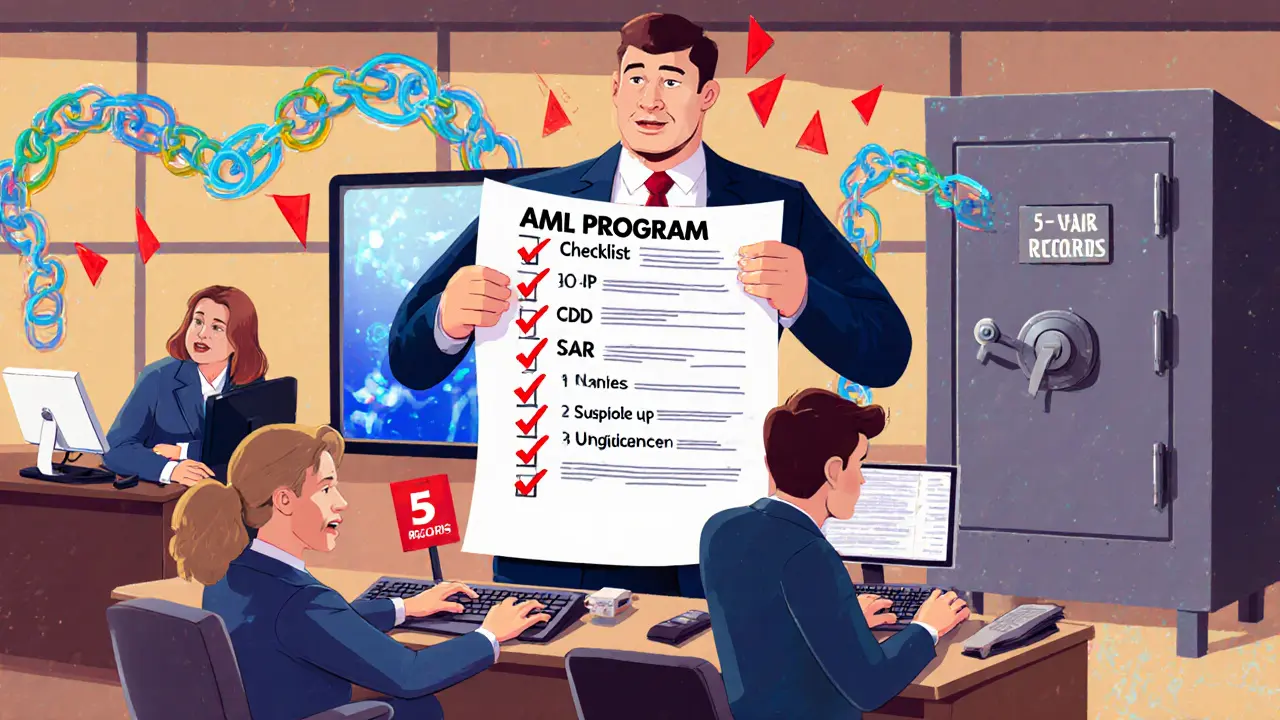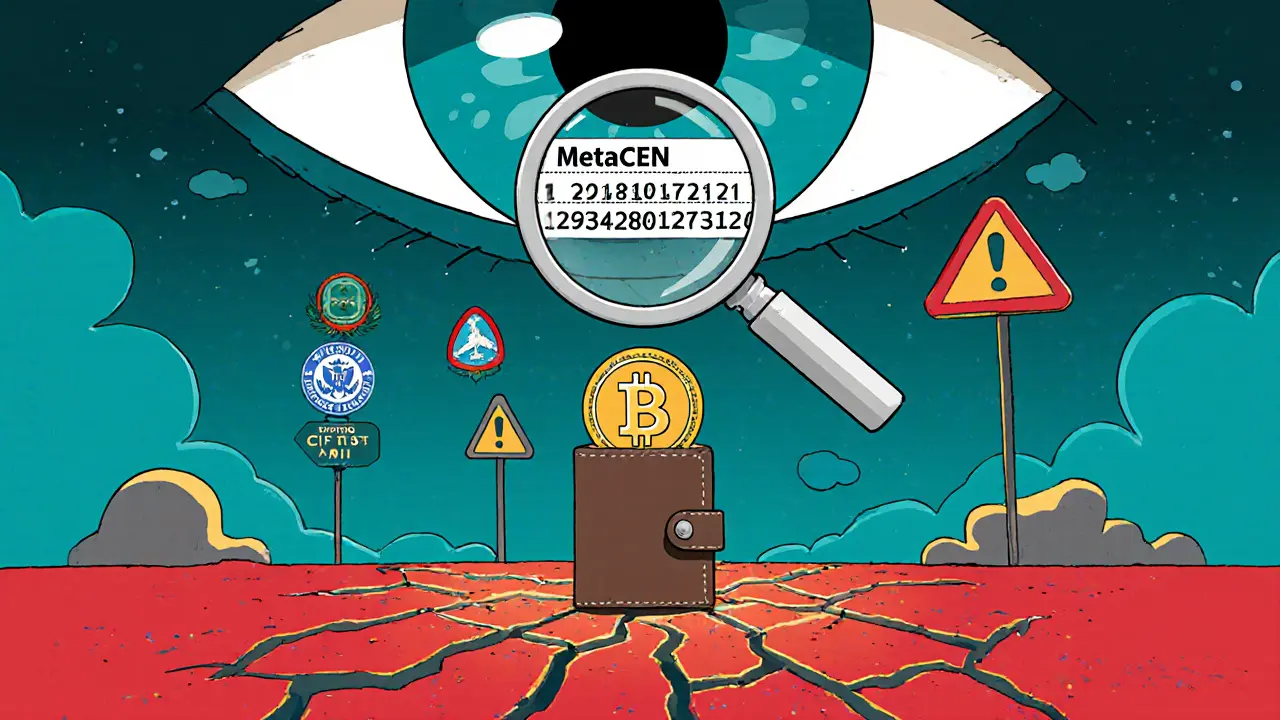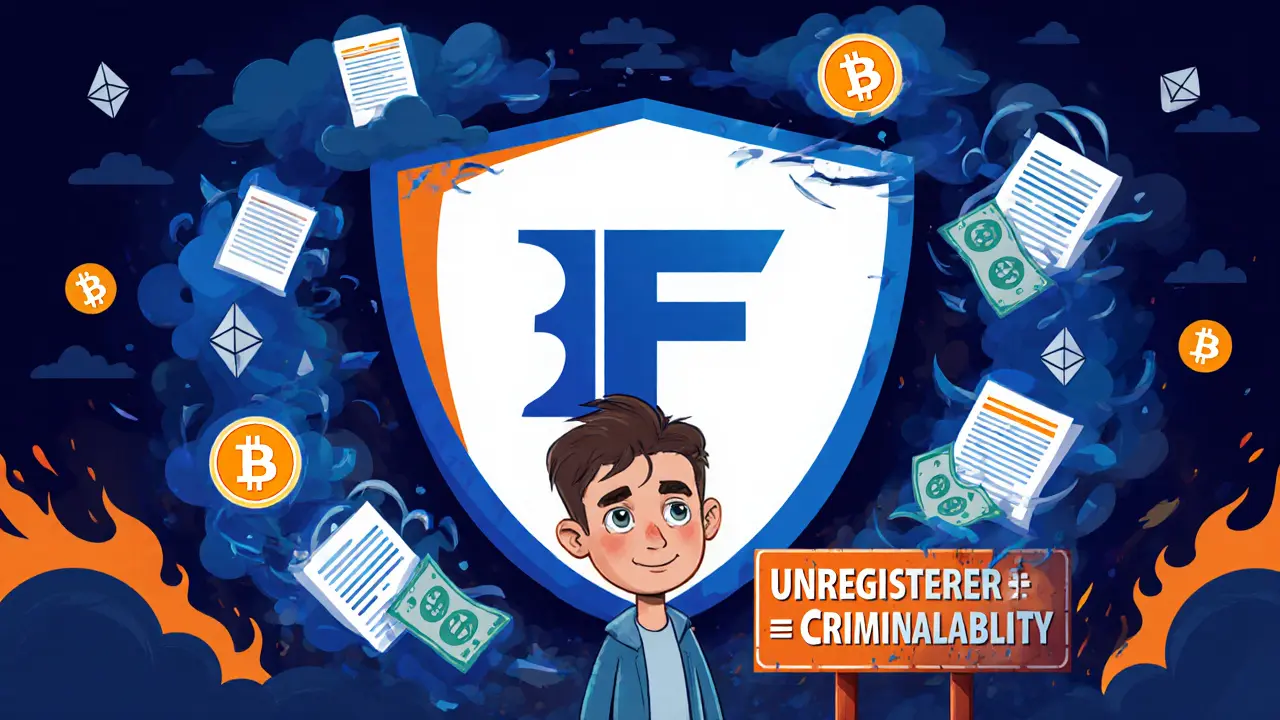Compliance Cost Calculator
Calculate Your Compliance Costs
Estimate your startup costs for FinCEN registration and state licensing requirements based on your business size.
If you run a cryptocurrency exchange in the U.S., you’re not just running a tech business-you’re running a financial institution under federal law. FinCEN, the Financial Crimes Enforcement Network, doesn’t issue licenses like a state agency. But if you handle crypto-to-fiat trades, custody wallets, or even peer-to-peer swaps, you must register as a Money Services Business (MSB). Skip this step, and you’re not just risking fines-you’re risking shutdown, criminal charges, and personal liability.
Who Exactly Needs to Register?
FinCEN’s rules don’t care if you call yourself a "crypto platform," "decentralized app," or "wallet provider." If you’re moving value that substitutes for money, you’re covered. That includes:- Centralized exchanges that let users trade Bitcoin for USD or Ethereum for USDT
- Custodial wallet services holding crypto on behalf of users
- Payment processors that convert crypto to fiat for merchants
- Platforms enabling peer-to-peer transfers where you act as an intermediary
Even if you restrict users from depositing funds from third parties or limit internal transfers, you still need to register. FinCEN doesn’t make exceptions for "small" or "niche" operations. The trigger is simple: if you transmit value that acts like currency, you’re a money transmitter under the Bank Secrecy Act.
The Registration Process Isn’t a One-Time Form
You can’t just file a form and forget it. FinCEN registration is the start, not the finish. The process involves:- Submitting Form 107 (Registration of Money Services Business) through the FinCEN BSA E-Filing System
- Providing detailed business information-ownership structure, physical addresses, contact details
- Designating a compliance officer responsible for AML/CFT programs
- Creating and implementing a written Anti-Money Laundering (AML) program
There’s no license number you get back. No certificate. No approval email. FinCEN just acknowledges receipt. Your registration is active once submitted-unless they reject it for incomplete info. But here’s the catch: you can’t operate legally without a fully functioning AML program in place before you even file.
What Your AML Program Must Include
FinCEN doesn’t leave you guessing. Your AML program needs four core components:- Customer Identification Program (CIP): You must verify every user’s identity using government-issued ID, proof of address, and facial recognition or document authentication tools. No exceptions for "small deposits."
- Customer Due Diligence (CDD): Beyond ID, you must understand the nature and purpose of each customer’s activity. Are they trading daily? Sending large sums to offshore wallets? That’s red flag territory.
- Suspicious Activity Reporting (SAR): If something looks off-unusual patterns, structuring, mixing, or rapid transfers-you have 30 days to file a SAR with FinCEN. Failing to report is a federal crime.
- Recordkeeping: You must keep transaction records for five years. That includes IP addresses, device IDs, wallet addresses, and timestamps for every transfer.
These aren’t suggestions. They’re legal requirements. And FinCEN audits. They’ve fined exchanges millions for missing SARs or incomplete KYC. In 2023, one exchange paid $60 million for failing to verify users and monitor mixing services.
State Licenses Are Just as Important
FinCEN is federal. But you can’t operate in California, New York, or Texas without a state Money Transmitter License (MTL). Each state has its own application, fees, bonding requirements, and audit processes. New York’s BitLicense alone can cost over $50,000 in legal and compliance fees just to apply.There’s no federal override. You need both: FinCEN registration and state MTLs in every state where you have customers. Some exchanges avoid this by partnering with licensed entities-like using a licensed bank or payment processor as their front end. But even then, you’re still responsible for compliance.

Other Agencies Are Watching Too
FinCEN isn’t alone. The SEC watches if you’re trading tokens they classify as securities-like many altcoins. The CFTC steps in if you’re dealing with crypto derivatives or futures. The OCC regulates banks that custody crypto or issue stablecoins. And if you’re running a DeFi protocol that still handles user funds? You’re not off the hook. Courts have ruled that operators can be held liable under BSA rules, even if the platform is "decentralized."That means a single exchange might be under FinCEN, SEC, CFTC, and five state regulators at once. One misstep in one area can trigger enforcement actions across all.
Costs Are High-and Growing
Let’s break down the real cost:- FinCEN MSB registration: $0 fee, but requires legal and compliance setup ($10,000-$50,000)
- State MTLs: $2,500-$25,000 per state, plus bonds and annual renewals
- KYC/AML software: $5,000-$20,000/year for tools like Sumsub, Jumio, or Trulioo
- Compliance staff: $80,000-$150,000/year for a full-time officer
- Legal counsel: $150-$400/hour for ongoing advice
Total startup cost for a small exchange? $150,000-$400,000 minimum. And that’s before marketing, tech, or servers. That’s why so many new entrants fail before they even launch.
What’s Changing in 2025?
FinCEN’s 2024 proposed rule would treat convertible virtual currencies as "monetary instruments" under the BSA-just like cash. That means:- Transactions over $10,000 involving unhosted wallets (like MetaMask) must be reported
- Exchanges must verify identities for users sending crypto to wallets in high-risk jurisdictions
- Recordkeeping extends to metadata like transaction hashes and blockchain addresses
That’s a game-changer. If you’re running a platform that lets users send crypto to non-custodial wallets, you’ll need to track where it’s going. That’s not just tech-it’s legal risk. Mixing services, privacy coins, and cross-border transfers are now top enforcement targets.

What Happens If You Don’t Register?
The penalties aren’t warnings. They’re federal crimes.- Fines up to $500,000 per violation
- Civil penalties of $10,000 per day for ongoing non-compliance
- Criminal charges for willful violations-up to 10 years in prison
- Asset seizure and permanent business shutdown
In 2023, a crypto exchange in Florida was shut down after operating for 18 months without registration. The owner was arrested. His personal assets were frozen. His code was seized. He’s still fighting the case.
How to Stay Compliant
Here’s what works:- Register with FinCEN before you open to users
- Build your AML program with real tools, not templates
- Use automated KYC and SAR systems-don’t rely on manual reviews
- Train your team quarterly on new FinCEN guidance
- Keep detailed logs of every compliance decision
- Consult a lawyer who specializes in crypto regulation-not general business counsel
Compliance isn’t a cost center. It’s your license to operate. The exchanges thriving in 2025 aren’t the ones with the fanciest UIs-they’re the ones with the cleanest audit trails.
Do I need to register with FinCEN if I only trade crypto-to-crypto?
Yes. If you facilitate trades between different cryptocurrencies and act as an intermediary-meaning users don’t trade directly peer-to-peer-you’re transmitting value and must register as an MSB. FinCEN doesn’t distinguish between crypto-fiat and crypto-crypto trades when determining money transmission.
Can I operate without a state license if I’m only online?
No. Even if you’re based in one state and serve customers nationwide, you’re required to obtain a Money Transmitter License in every state where you have users. Some states, like New York and California, enforce this aggressively. Ignoring state rules is not an option.
What’s the difference between FinCEN registration and a BitLicense?
FinCEN registration is federal and covers AML compliance for money transmission. A BitLicense is a state-level license from New York that adds additional requirements like capital reserves, cybersecurity standards, and consumer protection rules. You need both if you serve New York customers.
Are decentralized exchanges (DEXs) exempt from FinCEN rules?
Not necessarily. If your DEX has a central operator who controls user funds, sets trading rules, or charges fees, FinCEN may treat you as a money transmitter. Courts have already held operators of "decentralized" platforms liable when they exercise control. True peer-to-peer swaps with no intermediary may be exempt-but most DEXs aren’t that pure.
How often does FinCEN update its guidance?
FinCEN updates its guidance regularly-often in response to new technologies or enforcement cases. Major updates came in 2013, 2019, 2023, and 2024. You must monitor their website and subscribe to their alerts. Compliance isn’t a one-time project-it’s an ongoing process.
Can I outsource my AML compliance to a third party?
You can outsource tasks like KYC verification or transaction monitoring, but you cannot outsource responsibility. FinCEN holds the exchange operator legally accountable. If your vendor fails, you’re still liable. Always maintain oversight and audit your third parties regularly.
